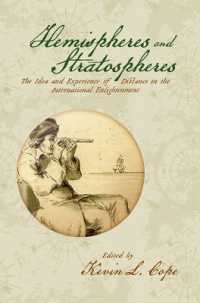- ホーム
- > 洋書
- > 英文書
- > Performing Arts
Full Description
American culture maintained a complicated relationship with Haiti from its revolutionary beginnings onward. In this study, Peter P. Reed reveals how Americans embodied and re-enacted their connections to Haiti through a wide array of performance forms. In the wake of Haiti's slave revolts in the 1790s, generations of actors, theatre professionals, spectators, and commentators looked to Haiti as a source of both inspiring freedom and vexing disorder. French colonial refugees, university students, Black theatre stars, blackface minstrels, abolitionists, and even writers such as Herman Melville all reinvented and restaged Haiti in distinctive ways. Reed demonstrates how Haiti's example of Black freedom and national independence helped redefine American popular culture, as actors and audiences repeatedly invoked and suppressed Haiti's revolutionary narratives, characters, and themes. Ultimately, Haiti shaped generations of performances, transforming America's understandings of race, power, freedom, and violence in ways that still reverberate today.
Contents
Introduction: performing the Haitian revolution; 1. Rebels and refugees: sentimental suffering and antic revolt in the 1790s; 2. The lessons of Haiti: performance, pedagogy, and the politics of Haitian independence; 3. Virtuosity, illegitimacy, and Haitian royalty: Ira Aldridge and Christophe, King of Hayti; 4. Travesty and transformation: Haiti and blackface minstrelsy; 5. Abolitionist acts: Haitian respectability, oratory, and celebrity performance; Conclusion: the pleasures and perils of revolutionary reenactment.





